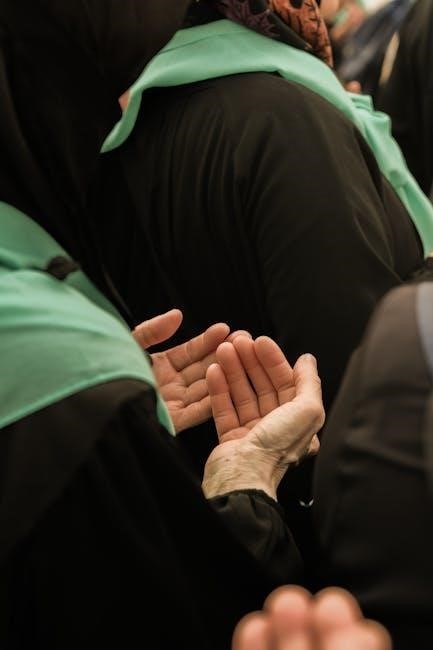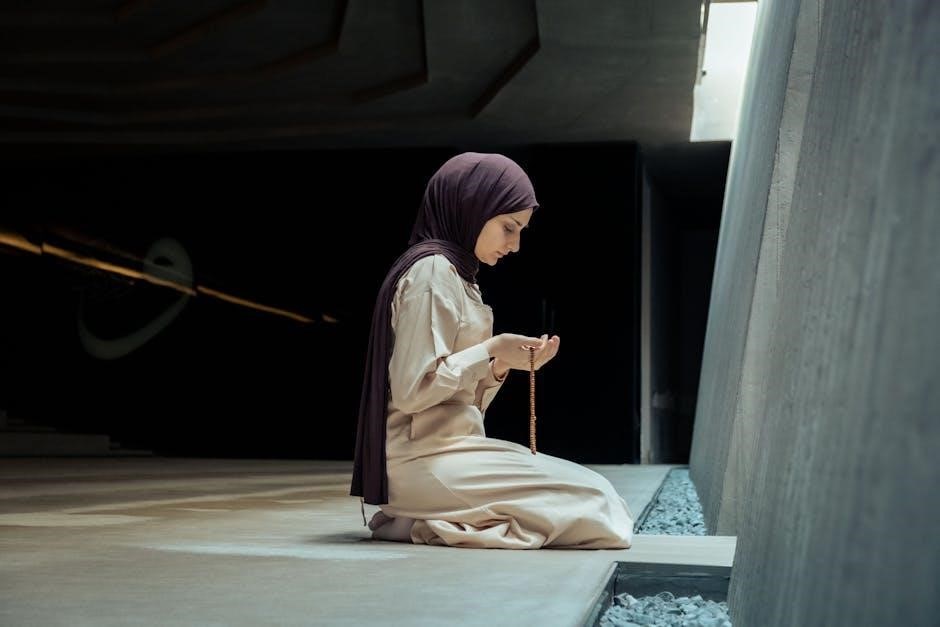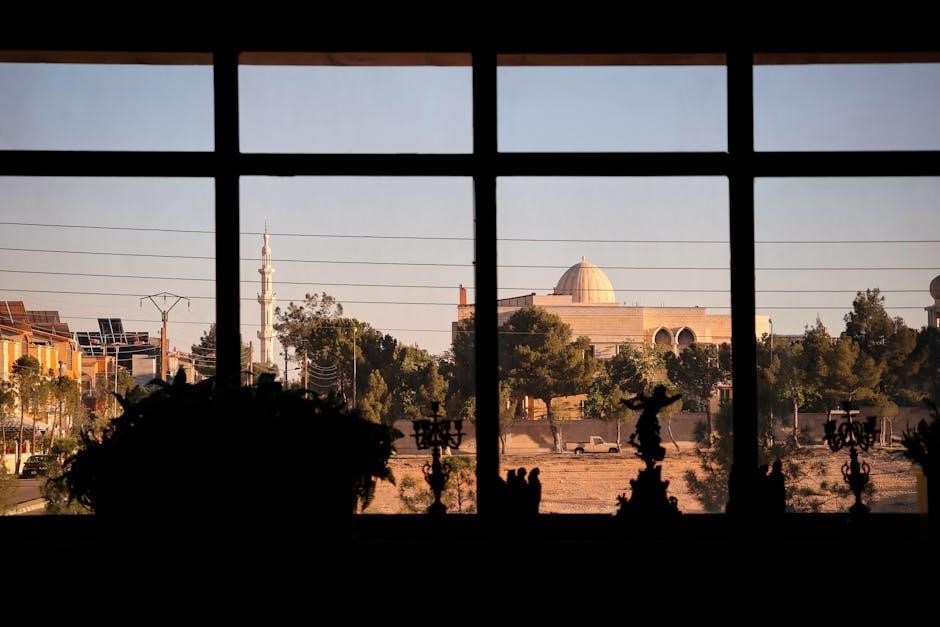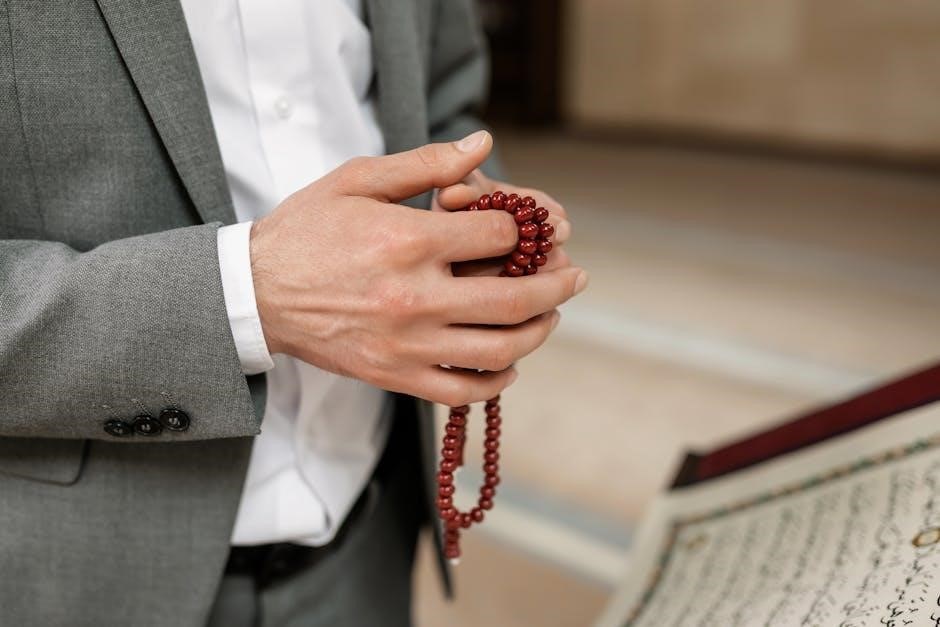The Janazah prayer is a collective obligation‚ seeking forgiveness for the deceased. It involves four takbirs and specific supplications‚ emphasizing community support and divine mercy‚ fulfilling a vital religious duty.
Overview of Janazah Prayer in Islam
The Janazah prayer is a collective obligation in Islam‚ performed to seek forgiveness and mercy for the deceased. It involves four takbirs‚ specific supplications‚ and is conducted standing facing the Qiblah. This prayer emphasizes community solidarity and spiritual support for the departed soul. It is a vital part of Islamic funeral rites‚ reflecting the Ummah’s shared responsibility to honor and pray for their deceased brothers and sisters.
Importance of Dua in the Funeral Prayer
Dua in the Janazah prayer holds profound significance as it seeks divine forgiveness and mercy for the deceased. Specific supplications are recommended after the third and fourth takbirs‚ emphasizing the community’s collective plea for the departed soul. These du’as‚ rooted in the Sunnah and Quran‚ highlight the importance of invoking Allah’s compassion and blessings. They also serve as a means of comforting the family and fulfilling a vital religious obligation.
Structure of the Janazah Prayer
The Janazah prayer consists of four takbirs‚ with specific supplications after the third and fourth. It is performed standing‚ without ruku or sujud‚ emphasizing a simple yet profound ritual.
Key Components of the Funeral Prayer
The Janazah prayer includes four takbirs‚ with specific supplications after the third and fourth. It involves Thana‚ Durood‚ and Quranic recitations‚ followed by duas for the deceased. Purity‚ wudu‚ and proper attire are essential. The prayer concludes with a single tasleem‚ emphasizing communal unity and mercy for the departed. These elements reflect the prayer’s simplicity and profundity‚ fulfilling a vital religious obligation.
Step-by-Step Guide to Performing Salatul Janazah
Begin by facing Qibla‚ forming at least three rows. Intend to perform Janazah prayer. Say Allahu Akbar (first takbir). Recite Thana and Durood after the second takbir. After the third‚ recite a specific dua for the deceased. Conclude with the fourth takbir and tasleem. Ensure purity‚ wudu‚ and proper attire. This structured approach ensures the prayer’s validity and reflects communal unity in seeking mercy for the departed.

Conditions and Requirements for Janazah Prayer
Purity‚ wudu‚ and covering the body’s awrah are essential. The prayer must be performed in congregation‚ fulfilling the communal obligation. Proper attire and respect are required.
Purity and Wudu for the Funeral Prayer
Participants in the Janazah prayer must ensure they are in a state of purity (taharah) and have performed wudu. Cleanliness is a fundamental requirement‚ mirroring the conditions for regular Salah. The deceased’s body must also be washed and shrouded appropriately‚ adhering to Islamic guidelines. These practices reflect the importance of maintaining dignity and respect in fulfilling this communal obligation.
Proper Attire and Etiquette During the Prayer
Participants in the Janazah prayer should wear modest and clean attire‚ reflecting respect for the occasion. Men are encouraged to dress appropriately‚ avoiding flashy clothing. Women must maintain hijab. The congregation should form at least three rows‚ standing shoulder-to-shoulder‚ to symbolize unity. Proper etiquette includes avoiding unnecessary talk and distractions‚ ensuring focus on the prayer and supplications for the deceased.
Specific Dua for Janazah Prayer
The Janazah prayer includes specific supplications after the third and fourth takbirs‚ such as Allahummaghfir lihayyina wa mayyitina‚ seeking forgiveness for the living and the deceased‚ emphasizing divine mercy and blessings.
Recommended Dua After the Third and Fourth Takbirs
After the third and fourth takbirs‚ specific supplications are recommended; The dua Allahummaghfir lihayyina wa mayyitina is recited‚ seeking forgiveness for both the living and the deceased. Another recommended dua is Allahummarhamhu wa anta khayrur rahimeen‚ asking Allah for mercy on the deceased; These supplications‚ rooted in Islamic tradition‚ emphasize divine mercy and blessings‚ and are often followed by additional prayers for the deceased’s soul.
Significance of Dua for the Deceased in Islam
Dua for the deceased is a significant aspect of Islam‚ emphasizing compassion and divine mercy. It seeks forgiveness and comfort for the soul‚ benefiting the living by fostering community and shared responsibility. Reciting supplications collectively strengthens faith and unity. Rooted in tradition‚ it highlights intercession and spiritual support beyond life‚ comforting the family and demonstrating collective care.

Common Mistakes to Avoid During Janazah Prayer
Common mistakes include forgetting to face Qibla‚ reciting additional verses‚ or failing to maintain focus‚ which can distract from the prayer’s solemnity and purpose.
Understanding Fard Kifayah in the Funeral Prayer
Fard Kifayah refers to a communal obligation‚ meaning the Janazah prayer becomes mandatory for the Muslim community collectively. If some members perform it‚ the duty is fulfilled for all. This principle emphasizes collective responsibility‚ ensuring the deceased receives proper rites while relieving individuals of personal obligation once others have fulfilled it.
Avoiding Makruh Times for Offering the Prayer
The Janazah prayer should be performed during appropriate times‚ avoiding Makruh (disliked) periods such as sunrise‚ noon‚ and sunset. These times are considered significant for other acts of worship‚ and offering the funeral prayer during them is discouraged. It is recommended to perform the prayer before or after these intervals to ensure respect for the deceased and adherence to Islamic guidelines.
Variations and Regional Practices
Regional practices vary‚ with some cultures incorporating local languages or additional supplications; Core rituals remain consistent‚ but cultural expressions enrich the prayer‚ reflecting diverse Islamic traditions globally.
Differences in Funeral Prayer Practices Across Cultures
Cultural variations exist in Janazah prayers‚ such as reciting supplications in local languages or adding regional customs. While the core rituals remain unchanged‚ practices like additional duas or unique supplications reflect cultural diversity. Some communities incorporate traditional chants or specific prayers‚ while others focus solely on Quranic recitations. These variations highlight the rich tapestry of Islamic traditions while maintaining the prayer’s essential purpose of seeking mercy for the deceased.
Language and Recitation in Janazah Prayer
The Janazah prayer primarily involves Arabic recitations‚ including the Thana‚ Durood‚ and specific Quranic verses. While the core elements are in Arabic‚ some communities incorporate additional supplications in their local languages. This practice reflects cultural adaptability while maintaining the prayer’s essence. The use of Arabic ensures universality‚ but regional languages may be used for supplementary duas‚ making the prayer accessible and meaningful across diverse Muslim communities worldwide.

Recommended Recitations and Supplications
Key recitations include the Thana‚ Durood‚ and specific Quranic verses. Supplications focus on seeking mercy for the deceased and are often recited in Arabic‚ following Sunnah traditions.
Thana‚ Durood‚ and Quranic Verses in the Funeral Prayer
In the Janazah prayer‚ the Thana is recited to glorify Allah‚ followed by the Durood‚ which seeks blessings for Prophet Muhammad (pbuh). Specific Quranic verses‚ such as those from Surah Al-Fatihah or Surah Yasin‚ are recommended to invoke mercy and forgiveness for the deceased. These recitations are performed after the first and third takbirs‚ respectively‚ and are essential components of the funeral prayer‚ emphasizing spiritual purification and divine compassion for the departed soul.
Sunnah Prayers and Supplications for the Deceased
The Sunnah prayers and supplications in Janazah prayer are vital for seeking Allah’s mercy for the deceased. After the third takbir‚ the recommended dua is “Allahummaghfir lahu warhamhu” (O Allah‚ forgive and have mercy on him). After the fourth takbir‚ the supplication “Allahumaghfir lihayyina wa mayyitina” (O Allah‚ forgive our living and deceased) is recited. These prayers‚ rooted in the Sunnah‚ emphasize the community’s role in interceding for the departed soul‚ ensuring a meaningful and compassionate farewell.

Role of the Imam in Janazah Prayer
The Imam leads the congregation‚ ensuring the prayer is performed correctly. He guides through the takbirs and supplications‚ fulfilling the Sunnah and communal duty effectively.
Leading the Funeral Prayer and Its Responsibilities
Leading the Janazah prayer is a solemn duty‚ requiring the Imam to guide the congregation through the four takbirs and specific supplications. The Imam must ensure the prayer is performed correctly‚ reciting Thana‚ Durood‚ and the recommended duas after the third and fourth takbirs. They must also end the prayer with tasleem‚ ensuring the congregation follows accurately. The Imam’s role includes maintaining proper etiquette‚ guiding the dua‚ and ensuring the prayer adheres to Islamic guidelines‚ fulfilling the communal obligation effectively.
Guiding the Congregation in Dua and Supplications
Guiding the congregation in dua and supplications during Janazah prayer is a critical responsibility. The Imam leads the recitation of specific duas‚ such as “Allahummaghfir lihayyina wa mayyitina”‚ after the third and fourth takbirs. This ensures the congregation follows correctly and collectively seeks mercy for the deceased. The Imam’s role includes reciting Thana‚ Durood‚ and the recommended supplications‚ ensuring the prayer is performed with proper etiquette and adherence to Islamic guidelines‚ maximizing the spiritual benefit for both the deceased and the community.
The Janazah prayer embodies collective responsibility and divine mercy. Performing it with sincerity ensures spiritual benefit for the deceased and strengthens communal bonds‚ fulfilling a vital Islamic duty.
The Collective Responsibility of the Muslim Community
The Janazah prayer is a shared obligation (Fard Kifayah)‚ emphasizing community unity. Participating in it ensures the duty is fulfilled‚ granting divine mercy. The Prophet (pbuh) highlighted that praying for the deceased earns spiritual rewards. Even if some attend‚ the entire community is absolved. This collective act reflects Islamic solidarity‚ fostering compassion and shared responsibility among believers‚ while seeking forgiveness and peace for the departed soul.
Final Dua for the Deceased and the Muslim Ummah
The final dua in the Janazah prayer seeks divine mercy for the deceased and the Muslim community. Supplications like “Allahummaghfir li hayyina wa mayyitina” (O Allah‚ forgive our living and deceased) emphasize collective forgiveness. The Prophet (pbuh) taught that praying for the deceased earns spiritual rewards. This dua unites believers‚ reinforcing compassion and solidarity. It concludes the prayer‚ imploring Allah’s mercy for the departed and the entire Muslim Ummah‚ fostering a sense of shared responsibility and spiritual connection.
